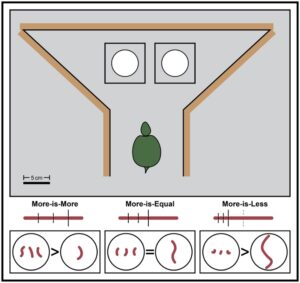Box turtles determine if “big equals more!”
Scientists at Zoo Atlanta recently published a study conducted by undergraduate students from Georgia Tech, colleagues at Georgia State University, and Zoo team members, investigating how eastern box turtles assess the amount of food presented versus the number of food items. Read on to learn more about the study’s findings.
Would you rather have three pieces of candy instead of just one? I’m sure you would prefer that! But what if the one piece of candy was actually larger than the three pieces combined? Which would you choose? This paper studied cognition, or how information is processed and used to form a decision, in turtles. While there have been hundreds of similar studies in birds and mammals, little work has been done to assess this type of thought process in reptiles, such as turtles, snakes, or lizards.
 We offered turtles their favorite food (earthworms) in two dishes in a Y-maze device and let the turtles choose which food to consume first, indicating the food that they found most enticing. Their options included a “more is more” offering in which three worm pieces represented more food than a single worm piece; a “more is equal” offering in which the three worm pieces represented the same amount of food; and a “more is less” offering in which the single worm piece represented more food than the three pieces combined.
We offered turtles their favorite food (earthworms) in two dishes in a Y-maze device and let the turtles choose which food to consume first, indicating the food that they found most enticing. Their options included a “more is more” offering in which three worm pieces represented more food than a single worm piece; a “more is equal” offering in which the three worm pieces represented the same amount of food; and a “more is less” offering in which the single worm piece represented more food than the three pieces combined.
We found that box turtles appear to use the number of food items as a primary means of making their choice, but that they were inconsistent with the more difficult situation where more pieces actually represent less food. These sorts of cognitive tasks are necessary challenges for all animals throughout their lives, yet there has been little study of how turtles manage their decision-making in confusing situations. Our results suggest that the turtles appear to base their decisions on the number of food items presented, but were attempting to incorporate additional information, and did not always make the choice that represented the most food.
But don’t worry, none of the turtles were ever denied their food! All the turtles got to eat worms on every trial and continue eating worms after the trial was complete.

Connect With Your Wild Side #onlyzooatl